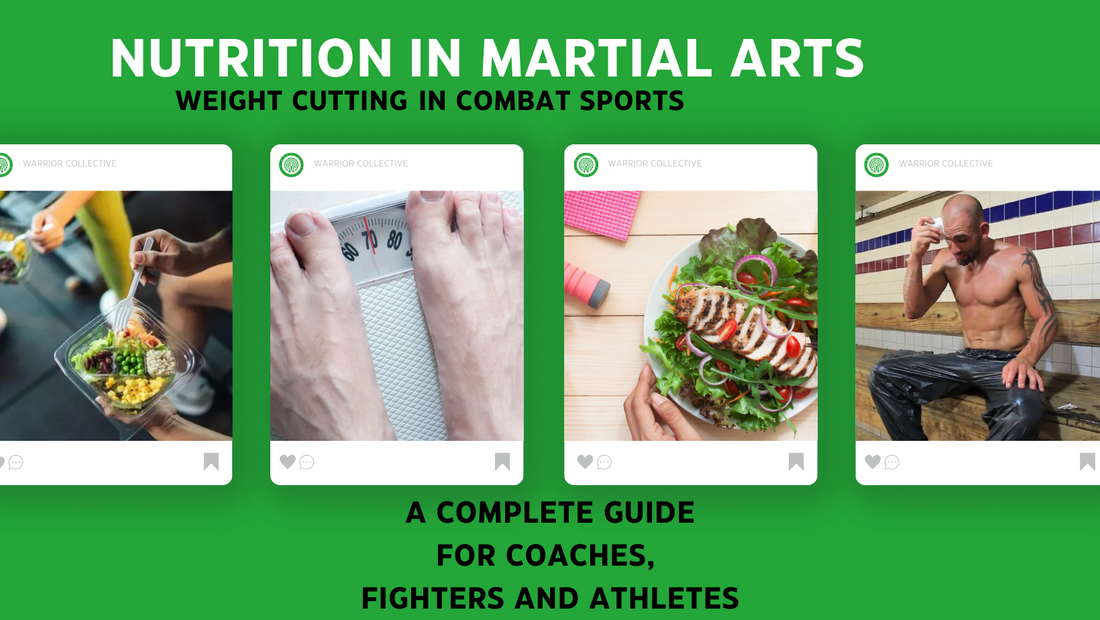
Nutrition in Martial Arts and Weight Cutting in Combat Sports
Through my #InsideChat podcast, I am able to personally speak with a wide range of leading figures from the world of martial arts, sports, psychology, sociology and nutrition on a regular basis. One such individual I had the pleasure of speaking to and learning from recently is my good friend internationally renowned sports nutritionist Matt Lovell. In this particular episode, we spoke about the massively important topic of Nutrition in Martial Arts and Weight Cutting in Combat Sports.
Nutrition in Martial Arts and Weight Cutting in Combat Sports
Proper nutrition is vital for any athlete, but especially combat sports competitors who need to make specific weight classes. Fighters cannot rely on dangerous dehydration alone. Optimal diet composition combined with safe cutting techniques enables shedding fat, retaining muscle, and promoting health. In this comprehensive post, we will cover key insights on nutrition and weight management in martial arts.

Understanding Macronutrients
A foundational knowledge of macros - protein, fat, carbohydrates - is essential before strategising weight loss. Fighters should consume around 2 grams of protein per kilo of lean body weight. Sufficient protein intake preserves muscle mass when cutting. Carbs fuel intense training so intake depends on the person and their activity levels. Around 1 gram of carbs per kilo of bodyweight is a starting point. Dietary fat should be adequate for hormonal health and absorbing fat soluble vitamins but minimised for weight loss.
Focusing on whole food sources of macros is preferable over supplements. But strategic use of protein shakes or peri-workout nutrition can help recovery and performance as needed. Begin by tracking current macros with an app. Assess if more protein or fewer carbs/fat are required to meet goals. Gradually adjust quantities to align with target numbers.
Balancing Energy In vs. Energy Out
Weight loss occurs in a calorie deficit when energy expenditure exceeds energy consumed. After finding a sustainable macro ratio, determine your caloric baseline or maintenance level using equations based on your stats. Reduce calories moderately below this, using higher deficits farther from fights and lower ones nearing competition. A 500 calorie daily reduction yields about 1 pound lost per week.
Monitor rate of fat loss and adjust intake if needed. Take into account both training and rest day nutrition needs. On hard workout days, consume more carbs to fuel activity and support recovery. On rest days, drop carbs and calories a bit while keeping protein adequate. Losing 1 kg per week on average is a reasonable goal over a training camp. Avoid drastic deficits that impede training performance.

Strategic Nutrition for Weight Cuts
In the final weeks of camp, some fighters employ specific techniques to cut water weight. But nutrition optimises fat loss over the whole training period leading up to the cut. High protein intake preserves muscle mass even in a large calorie deficit. Generous vegetable consumption provides vitamins, minerals, fibre and water to support health during demanding training.
Strategically manipulate carbs and fluids around workouts to reduce glycogen and associated water weight. Several days out from weigh-ins, limit carbs to under 50 grams. Maintain high protein while increasing water intake. Then 24-36 hours before weigh-ins, cut sodium and fluids to facilitate rapid water loss. After weigh-ins, focus on replenishing fluids, electrolytes, carbs and body salts lost in the dehydration process.
Portioning carb intake peri-workout and lowering carbs/fluids elsewise maximises fuelling and hydration for training while steadily dropping weight. Fighters should test cuts in practice well before fight week to fine tune nutrition strategies and validate they work. Consult coaches for exact protocols to follow.

Safe Versus Unsafe Weight Cutting Practices
Cutting moderate amounts of water weight through sweat suits, hot baths or saunas is generally safe if proper rehydration time is allowed before competition. But fighters must avoid severe dehydration from excessive water or sodium restriction. Risks include impaired brain, heart and kidney function. Proper nutrition enabling gradual fat loss over a full camp makes huge water cuts unnecessary.
Using diuretics is both unsafe and illegal (in some sports and countries). The NCAA prohibits excessive dehydration exceeding 5% of body weight loss in a week or 1.5% daily. While professional MMA currently lacks defined rules, promotions are gradually moving to discourage dangerous weight cutting. Fighters should prioritise health and use nutrition, not dehydration alone, for weight management.

Common Nutrition Mistakes in Combat Sports
Here are some of the biggest diet and weight cutting mistakes martial artists make:
- Not tracking macros and calories accurately when starting a diet
- Letting weight creep up substantially between fights and scrambling to cut
- Over-restricting food intake and training too hard on low fuel
- Cutting water too rapidly in the week before weigh-ins
- Rehydrating inadequately after weigh-ins before competition
- Reducing resistance training when cutting weight
- Following fad diets that lack scientific nutrition principles
- Trying new foods, supplements or protocols close to fight time
- Cutting too frequently throughout the year without building back up
Proper planning, diet, and weight cut scheduling prevents desperate last minute cuts. Fighters perform best when well-fueled and hydrated. Consult coaches to create a nutrition plan specific to your body, schedule, and goals.

Supplements for Recovery, Health and Performance
While whole foods should form the foundation of any diet, selected supplements can fill nutritional gaps and enhance training. Always prioritise scientific, safe products from reputable companies. Many fighters lack sufficient Vitamin D, Omega-3s, iron and other nutrients. Deficiencies impair recovery and health.
Whey protein powders provide high-quality protein for muscle repair and retention when cutting weight. Casein protein sustains muscle overnight. Branched chain amino acids (BCAAs) also prevent muscle breakdown between meals. Creatine boosts power output and post-workout recovery.
During brutal training camps, fighters need extra vitamins, minerals and antioxidants. A greens supplement covers nutritional bases. Engineered hydration and electrolyte products replenish what gets lost cutting weight. Carefully chosen supplements complement food intake.
Implementing Intermittent Fasting
Intermittent fasting (IF) works well for some fighters cutting weight. In IF, you eat only during a designated window such as 8 hours each day. The other 16 hours involve fasting, with exceptions for calorie-free beverages. Daily fasting periods promote fat burning, amplify cellular repair, and create an overall calorie deficit.
However, modifications may be necessary for fighters. Doing high-intensity, glycogen depleting training completely fasted can impair performance. BCAAs and whey protein support training in a fasted state. Or simply extend the “feeding window” on heavy training days to properly fuel sessions. Test different IF protocols in off-season to determine optimal individual timing for camps.
Typical fasting strategies include: 16 hour fasts with 8 hour “feeding window”, 24 hour fasts 2-3 times per week, alternate day fasting, and the “Warrior Diet” with a small meal at night and one large meal in afternoon. Again, modify approach based on your training schedule, body and preferences. IF is just one tool for enabling fat loss along with macro tracking and calorie balancing.

Watch and Listen to the full podcast between myself and Matt Lovell below
Sample Nutrition Plan for a Fight Camp
Here is an example nutrition plan for a fighter 12 weeks out from a championship match:
Daily Habits:
- Weigh daily to ensure weekly weight loss pace as planned
- Drink 1 gallon of water spread throughout the day
- Take vitamins, supplements and medication as scheduled
- Limit added sugar, junk food and alcohol
- Eat every 3 hours (6 meals/day)
Macro Targets:
45% carbs (3-4g/kg), 30% protein (2g/kg), 25% fat
Cardio Day Template:
- Pre-Breakfast: BCAAs, whey protein, creatine
- Breakfast: Eggs, oatmeal, fruit
- Snack: Whey, berries
- Lunch: Grilled chicken, sweet potato, greens
- Pre-Workout: Banana, whey
- Post-Workout: Whey, banana, rice cakes
- Dinner: Salmon, quinoa, asparagus
Strength Training Day Template:
- Breakfast: Omelette with avocado, oats
- Snack: Cottage cheese, nuts
- Pre-Workout: Rice cakes, whey
- Post-Workout: Whey, dextrose, banana
- Lunch: Burger patty, carb source, veggies
- Snack: Jerky, apple
- Dinner: Chicken stir fry
Rest Day Template:
- Breakfast: Protein pancakes
- Snack: Whey and almond butter
- Lunch: Salad with salmon and avocado
- Snack: SlimFast keto shake
- Dinner: Fish, riced cauliflower, greens
This plan allows for modifications based on evolving training demands. The fighter tracks weight daily to adjust nutrition if needed to hit weekly targets. It focuses on high protein, vegetables, limited processed foods. Within these parameters, personal preferences dictate exact meal choices.
Making Weight While Staying Healthy
Cutting too much weight or cutting weight too often both jeopardise long-term health and performance. Losing more than 2% bodyweight per week through restricted intake interferes with training capacity. Fighters accumulate more trauma competing in a depleted state. Excessive weight fluctuations also dysregulate metabolism over years.
Ideally compete near your “walk around weight” and avoid cuts over 10% of body weight. Losing 1 kg per week through diet and training is safer than losing 5 kg in the final week alone. Start dieting early enough to avoid drastic cuts at the end. Build up competitively between fights so you avoid repeating hard cuts bout after bout.
Females face higher risks cutting weight compared to males. Due to lower body weight and essential fat levels, even small weight cuts become dangerous for women. Avoid frequent and aggressive cuts.
Weight cuts will always play a role in combat sports. But with smart nutrition guidance and practices that prioritise health, fighters can make weight while optimising their chances of victory.

Using Nutrition Periodisation for Performance
Implementing “nutrition periodisation” over the training calendar helps fighters peak for competitions. Periodisation means structuring your plan and shifting priorities over time. For example:
Off-season: Higher calories support strength gains and muscle growth. Emphasise macros for building mass - protein, carbs, healthy fats. Use small calorie surpluses to limit fat gain.
Pre-camp: Transition into fat loss mode. Create initial calorie deficit through diet and training to start dropping weight. Increase cardio while maintaining lifting volume/intensity.
Training camp: Progressively lower calories to continue fat loss trajectory. Manipulate carbs and fluids strategically. Lift explosively while increasing conditioning work. Prioritise recovery.
Fight week: Make final water cut through methods like hot baths, saunas. Sharply reduce carbs and sodium. Focus only on rehydrating and refuelling once weigh-ins complete.
Post-fight: Eat abundantly for 2-3 days to replenish glycogen and nutrients. Get plenty protein and micronutrients to heal. Allow hormones to stabilise before dieting anew.
Nutrition changes match the training phase. Meticulously track data to make adjustments from camp to camp. No need to diet severely in off-season - use surpluses to grow, then diet down. Proper periodisation reduces the need for harsh cuts by preventing excess weight gain in the first place.
Working with a Sports Nutritionist
All serious fighters should consider working with a qualified nutrition coach or sports dietician. They can perform testing to identify potential vitamin/mineral deficiencies impairing performance and provide personalized meal plans based on your goals. A knowledgeable coach prevents small mistakes that derail progress.
Look for credentials like Certified Sports Nutritionist (CISSN), Precision Nutrition certification, or degrees like Registered Dietitian when seeking experts. Good coaches take a holistic approach focused on your entire lifestyle and habits - not just pre-packaged meal plans. A long term partnership enables improving diet over years as needs and goals evolve.
A coach can monitor and advise changes during cuts, ensuring health remains the priority. They can also provide accountability and emotional support during the sacrifices of camp. While generic diet templates found online offer value, custom plans accelerate results. Seek coaching if you struggle with consistency, temptation or simply want expert oversight.
Holistic Lifestyle Habits
Superior physiques and performances stem from holistically optimised lifestyles, not just commander nutrition. Here are some other habits to synergise with diet:
- Hydration: Drink sufficient water and electrolytes daily, not just when cutting.
- Sleep: Prioritise sleep quantity and quality. Optimise bedrooms for restful sleep.
- Stress: Manage life stresses proactively. Avoid overcommitting your time and energy.
- Recovery: Use modalities like massage, ice baths, foam rolling and meditation.
- Relationships: Surround yourself with positive, supportive people. Reduce toxic contacts.
- Nature: Spend time outdoors disconnected from technology as often as possible.
Though not directly related to nutrition, these lifestyle factors massively influence overall health and training capacity. Holistic self-care reduces inflammation, balances hormones, sharpens focus, prevents burnout and heightens enjoyment of the process.
Proper fuelling enables fighters to perform at their peak while protecting health and longevity in their careers. Training the mind goes hand in hand with training the body. Those who embrace scientific nutrition principles give themselves an edge over less strategic competitors.
Matt Lovell, (BA (Hons) Dip ION NTCC CNHC Registered mBANT) is a specialist performance nutritionist with 20 years' practical experience in elite sports.
He has worked at the top of elite sports for over 20+ years. As the lead nutritional clinician in performance teams across world cup winning, premiership, European title and world title teams and Olympic medallist athletes alike.
Matt has worked directly with international teams (England Rugby and Football, Manchester City, Tottenham, Aston Villa) and many individual athletes (Jonny Wilkinson, James Haskell, Jermain Defoe, Jodie Taylor, Will Sharman, Vic Wild) from the sporting world, as well as the likes of actors such as Hollywood superstar Ed Skrein.
His nutrition company Aminoman is one of the leading supplements producers and suppliers in the UK today.
FIND MATT ON INSTAGRAM: @aminomanmatt
CHECK OUT MATT'S WEBSITE: www.aminoman.com
CONTACT MATT VIA EMAIL: matt@aminoman.com
Related Content
If you enjoy this article then you may well love 7 Great Muay Thai books you NEED to have on your bookshelf or 10 of the Best Dutch Kickboxing Gyms you should visit in 2023 as already featured on this site.
Warrior Marketplace
Here, you can also learn more about all of the other exceptional exceptional Muay Thai, Kickboxing, Boxing, Karate and Taekwondo Instructional Volumes featured on the Warrior Collective!
Thanks for reading, I hope you enjoyed reading this article on How to train Muay Thai on your own without a coach or training partner, please like, share and don't forget to subscribe to the Warrior Collective Youtube Channel for great training videos each week!!
Keep up to date with the Warrior Collective
